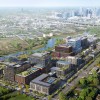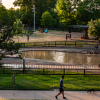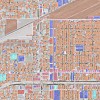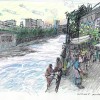
Tall building council looks upward to support a more walkable, sustainable Houston
In the 2023 Kinder Houston Area Survey, about 60% of respondents expressed a desire to live in a mixed-use development instead of a single-family home.

Tall building council looks upward to support a more walkable, sustainable Houston
In the 2023 Kinder Houston Area Survey, about 60% of respondents expressed a desire to live in a mixed-use development instead of a single-family home.

Houston needs improving. Are Houstonians really willing to pay for it?
From parks to police to garbage pickup, our surveys have tapped into a surprising level of support for raising revenues to help the city of Houston improve services and raise the quality of life across the city. What should we make of that? Are Houstonians really willing to pay more for better local government?

Could parks be a panacea for what ails Houston? Here’s what the research says
During the height of the COVID-19 pandemic, urban parks and greenspace provided welcome respite and recreation when people had to spend a lot of time indoors. That renewed appreciation for parks confirmed what many researchers have been pointing out for decades: They provide cities huge benefits for public health, the environment and the economy.

With conservation districts, Houston could have a new path to preserve neighborhoods
In October 2010, city officials were poised to strengthen Houston’s historic preservation law by adding a provision that, for the first time, would empower the city to forbid the demolition of certain homes in designated historic districts. Preservationists, who referred to the concept as “no means no,” were elated. But during last-minute wrangling over details, a Heights resident named Calvin Simper urged the City Council to reject the whole idea.

The Plant/Second Ward developers hope to balance walkability and affordability in Houston’s East End
A Houston-based real estate acquisition, development and management company is in the beginning phases of reshaping parts of the East End and Second Ward into a more walkable and equitable place that adds to the neighborhood’s diversity.

Greener Gulfton effort plants seeds for alleviating neighborhood's nature inequity
In August of 2020, a heat mapping campaign identified Gulfton as the hottest neighborhood in Houston. The effort, co-led by The Nature Conservancy and the Houston Advanced Research Center, indicated that the southwest Houston neighborhood was 17 degrees warmer than the coolest neighborhood measured. A community-driven plan, “Greener Gulfton,” seeks to decrease the sweltering temperature, while adding an array of benefits to the immigrant-rich area that 45,000 residents call home.

Ten Across Summit: The Future is Here
The Ten Across Summit will convene a premier group of leaders and experts to discuss important issues such as water, energy, infrastructure, equity, democracy and risk.

Is Houston really better off without zoning? One planner makes the case in ‘Arbitrary Lines’
A new book, “Arbitrary Lines,” argues that a century of zoning has hardened racial and class segregation in cities across the U.S. and worsened the effects of inequality by making it almost impossible to build anything but single-family homes in some cities. Author and planner M. Nolan Gray says there is a better way: Just look at Houston.

Borderlands without borders: How poetry can dismantle the walls between planners and communities
As a method of community planning, and as an impetus for creative placemaking (and placekeeping), poetry can help anyone–not just writers–think about how they are situated within their local communities and urban spaces. By writing poetry, any member of the public—in particular, those who are historically underrepresented—can turn conceptions into things that can be discussed and implemented. Since poetry has dislodged itself from patrician control and has found fertile ground in the digital landscape, it can be easily shared within local contexts and beyond.

It is time to recognize the Rio Grande Valley as a rising borderland metropolis
The Rio Grande Valley (RGV), or el Valle del Rio Bravo as it is known in Mexico, is often considered a far-flung collection of small-town border communities. As such, it remains largely unknown to the rest of the U.S., except when cited as one of the poorest areas in the country alongside Middle Appalachia or the Lower Mississippi Delta.

An economist’s case for urban density: It’s just math
Conversation about land use and building in cities often turns to questions of aesthetics or personal preferences. You find impassioned advocates of various kinds of architecture or lifestyle.

After 20 years, the center of Harris County's population has moved outside the Loop
In 20 years, the population center of Harris County moved 2 miles, taking it from the heart of the historic Heights area and outside the Loop for the first time. It’s yet another sign of the suburban surge underway in the Houston area.

I just took a trip to Switzerland and southern Germany, and was amazed by what I saw and experienced. As a country goes, Switzerland is relatively old, landlocked, and small. However, despite its reputation for being just about chocolate and skiing, it’s also quite diverse, both socially and economically. Its terrain is wildly varied, combining mountains, valleys, plains and lakes, with historically strong and distinct areas clearly defined in each area. And Switzerland consistently ranks near the highest in terms of overall quality of life.

What if houses of worship helped build more affordable housing?
Many houses of worship own empty and underused buildings and land. Cities and counties need properties for affordable housing. Seems like a match made in, well, heaven.

3 trends in urban planning that will shape how we live in the endemic-COVID era
It is now clear that the pandemic will not be behind us anytime soon. The pandemic variants and skepticism over the vaccine have made the potential for herd immunity (requiring a very high vaccination rate globally) difficult if not impossible to attain. This means that we are probably going to have to live with COVID for the foreseeable future and to adapt continuously to its impacts to our way of life.
Rice University
Kraft Hall
6100 Main Street, Suite 305
Houston, TX 77005-1892